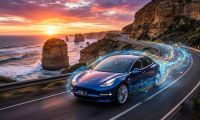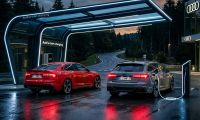Toyota learned the meaning of “uncontrollable factors” in business this week. The results of that lesson is that Toyota is now announcing, again, its commitment to electrified vehicles, and yes, battery-electric vehicles (BEVs) are a big part of the newest announcement.
What Are Uncontrollable Factors
In business, and particularly marketing, uncontrollable factors are business environment changes that a company cannot stand in the way of or change to its liking. The “marketing for dummies” class example of uncontrollable factors are often the buggy whip. When horseless carriages emerged in the early part of the 20th century, the folks who made the whips to hit horses pulling carts saw a drastic decline in business. The shift away from internal combustion and to BEVs is a perfect modern example. Toyota’s hybrids are the next buggy whip.
Being Greenest No Longer Counts
Although Toyota has the greenest vehicle models and sales, in most vehicle segments, in all of the markets in which it chooses to dominate, it’s not enough. Policymakers are moving toward BEVs and the automakers will follow. Lawmakers, a meaningful number of whom live in cities and don’t drive themselves anywhere, don’t have an emotional attachment to private transportation, and their advisors counting the heads of the vocal populace they represent understand that it’s BEV or bust going forward with public policy.
Toyota’s Statement Says a Lot
Toyota announced today, “For over 30 years, Toyota has been innovating and investing in technology to reduce vehicle emissions and achieve carbon reductions,” said Chris Reynolds, chief administrative officer, Toyota Motor North America. ”And, although some people believe concentrating resources on one possible solution will achieve the goal more quickly, we believe investing in many different solutions will actually be a faster way to achieve carbon neutrality around the world.” We highlighted "some people."
What that statement means is “We understand that BEVs are the wrong technology for many reasons, but we have no choice but to get on the path to a technology we don’t support because our lobbyists have informed us that the US government is going to incentivize BEVs and eventually outlaw ICE vehicles.” Again, the second quote is our words in case that was unclear.
Have You Heard The One About Hybrodrogen-Powered EVs?
Toyota could not resist including hydrogen-powered fuel cell electric vehicles (FCEV) in its announcement. Those BEV advocates who rolled their eyes at the announcement who also read the details can now smack their foreheads. FCEVs are the EV that even pro-EV people don’t want. Toyota’s shift in thinking is still evolving. Give the company some time to explain why its billion-dollar bet on hydrogen isn’t going to work out.
So What’s Toyota’s Plan?
Here is what Toyota laid out as its plan and timeline:
-Battery electric vehicles (BEVs) and fuel cell electric vehicles (FCEVs) will make up 15% of U.S. sales by 2030
-Electrified vehicles including BEVs will make up 70% of U.S. sales by 2030
-Global sales of approximately 8M electrified vehicles by 2030 of which 2M will be BEVs and FCEVs
Also, please see more details about Toyota's New EV plan and follow us on Twitter for daily EV news.
Toyota has unveiled a new electric vehicle plan or a new plan with a heavy emphasis on electric vehicles with three points.
-
Watch https://t.co/mchj9M76oY
-
Ready https://t.co/tVyjpQEcKX
-#Toyota #ToyotaEV Thanks @JohnGoreham. @Toyotajeff1 @toyota
- pic.twitter.com/bU5cDKt3nV— Torque News (@torquenewsauto) May 12, 2021
What Does This Mean For Top Sellers Like the RAV4 Hybrid and RAV4 Prime
Enjoy the short twilight of plug-in hybrids with 600-mile ranges and 40 MPG and 50 MPG gas-electric hybrids without plugs. This writer suspects strongly that the taxpayer-funded price supports that nearly all carmakers and buyers will soon rely upon won’t include PHEVs like the RAV4 Prime and already doesn’t include 40 MPG crossovers like the RAV4 Hybrid. Toyota will continue to trickle them forth since they are already designed and selling well today. There won’t be many more, if any, coming.
Toyota’s BEV Past and Its FCEV Present
Toyota tried battery-electric vehicles before the modern wave we think of today. How long ago was it? The song Candle In the Wind was the top hit of that year. Sort of appropriate. A handful of Toyota’s first-generation and later second-generation BEVs are still on the road. There are Facebook clubs you can join to interact with owners of first and second-generation RAV4 battery-electric crossovers. Toyota also presently “sells” its second-generation Mirai fuel cell electric vehicle in limited markets to the tiny handful of people that live near any place to fuel it.
What About Emission-Free Semi Tractors?
The tractors that pull 18-wheelers are so polluting you can see and smell the pollution coming from them. You can also hear them from more than a mile away as they brake or accelerate. Toyota has zero-emission semi tractors at work in California in a small pilot program right now. Toyota’s new announcement makes no mention of the zero-emission semi-tractors it has been working on. Projects like that can make a meaningful difference in our environment, but there is no advocacy group demanding them, so expect the project to stall in the coming decade. Those resources are needed elsewhere now.
Toyota Looks Back At Its Impact On The Environment
Toyota likes to remind people that it has been making vehicles that have a positive impact on the environment for 30 years. Toyota says that its no longer loved HEVs, PHEVs, and FCEVs have saved 139 million tons of greenhouse-gas emissions worldwide–76 million tons in the U.S. That accomplishment is unmatched by the large full-line automakers combined. Nobody cares because “Tesla’s next car will cost only $5k.”
The Author's View:
Toyota titled its press release, "Toyota's Path To Carbon Neutrality." The title conveys to this green vehicle fan that Toyota is clinging to an old concept. Many EV shoppers/owners/advocates don't really want carbon neutrality anymore. They have moved past that idea. What they primarily want from automakers is gas to be gone. Now. Not later. So, for these vocal advocates of BEVs, any hint that a car company isn't 100% on the fast lane to BEVs is the reason for ridicule. I don't hold that view, but I observe it in my daily research on EVs and shopper trends. If this announcement wins the hearts and minds of the EVangelists that shout down any argument that PHEVs or hybrids are the best solutions for many owners' needs, I will be shocked.
A Second Viewpoint
We are fortunate to have as an affiliate contributor, Dean McManis. Dean is a multiple EV owner past and present. Here's his take: "It is easy to jump on Toyota for moving slowly towards BEVs, and speaking out loud about their reasons for being conservative. But Toyota is just voicing the concerns of many legacy automakers who have invested in ICE technology for decades now. We can applaud Tesla, Rivian, Lucid, and others for being BEV-only advocates, and driving the EV market forward. And we can support big, legacy automakers like VW, GM, Hyundai, and now Ford that have committed to moving to add more BEVs soon. But in the broader spectrum of automakers, Toyota is still moving forward. And despite the fact that they are moving more slowly towards BEVs than they need to, they are still well ahead of countless legacy automakers like Chrysler, who have not even made public plans for any BEVs at all, and are barely moving to add a few plug-in hybrid models today. Experienced EV owners like myself will continue to call Toyota out on their excuses why they are not moving quickly on BEVs yesterday and today, but I'm still encouraging them for the positive EV work that they are doing. Because the world is watching Toyota, along with the other huge, legacy automakers to see if they will lead, go with the flow, drag their feet, or ignore the BEV movement entirely and continue to do business as usual (ICE production)."
John Goreham is a long-time New England Motor Press Association member and recovering engineer. Following his engineering program, John also completed a marketing program at Northeastern University and worked with automotive component manufacturers. In addition to Torque News, John's work has appeared in print in dozens of American newspapers and he provides reviews to many vehicle shopping sites. You can follow John on Twitter, and view his credentials at Linkedin
Set Torque News as Preferred Source on Google












Comments
"Give the company some time
Permalink
"Give the company some time to explain why its billion-dollar bet on hydrogen isn’t going to work out."
It might not work out for the Mirai, but it will work out for larger FCEV's. What Toyota learned from the Mirai is being applied to larger vehicles. Toyota is also getting into green hydrogen stations and hydrogen power.
Since Toyota has the best hybrid technology, they should be working on applying it to FCEV's. Like gasoline PHEV's, plug-in fuel cell hybrids would be more economical if the battery was large enough to provide a decent amount of battery-only driving to save on hydrogen. Range would also be extended.
Al, I really hope you are
Permalink
In reply to "Give the company some time by Al D (not verified)
Al, I really hope you are right. The FCEV technology seems ideal for heavy movers like tractor-trailers. I'd sure like to see it applied to the Boston-area commuter rail trains I can see and smell from my home as well.
Let them die a slow agonizing
Permalink
Let them die a slow agonizing death for being so stupid! The rest of the world is converting but Toyoda can not see and read the handwriting on the wall or the laws being passed!
Yeah! Who needs the most fuel
Permalink
In reply to Let them die a slow agonizing by Dale Kloss (not verified)
Yeah! Who needs the most fuel-efficient full-line automaker in the world making the most green vehicles, right? ;)
Toyota is one of the most
Permalink
In reply to Let them die a slow agonizing by Dale Kloss (not verified)
Toyota is one of the most forward thinking companies on the planet!
Great article. Toyota does
Permalink
Great article. Toyota does great things and will continue. For now it is them vs US mainstream media and US government since our car companies can't come close to competing without them.
Thank you, Baret. I wasn't
Permalink
In reply to Great article. Toyota does by Baret (not verified)
Thank you, Baret. I wasn't sure how this one would go over.
Thank you for your
Permalink
In reply to Great article. Toyota does by Baret (not verified)
Thank you for your intelligent response
Reminds me of the joke of an
Permalink
Reminds me of the joke of an ad Toyota did about their fully electric car that you didn't have to plug in. Forget cords and wires, only add a little gasoline...
Still cracks me up thinking about it.
This article is a joke and
Permalink
This article is a joke and written by someone who knows absolutely nothing about marketing. Hybrid vehicles are not a buggy whip. They outsell BEV handily. And, they will continue that trend. Hydrogen cars are the future. They are the absolute greenest cars available. BEV's are a distraction. They will run their course and Hydrogen will replace them. BEV's are a micro-niche product and their proponents are brainwashed by Musk. And, Musk will unload his car company in a second, if he could find a sucker buyer.
I WORK AT A LEXUS DEALER, 1
Permalink
I WORK AT A LEXUS DEALER, 1 PERSON A MONTH WILL ASK FOR EV .
CAN'T WAIT UNTIL EDISON IN NYC CITY ASKS EVERYONE TO LOWER THEIR AC EVERY SUMMER, AND THEN ALL OF THE EV'S COME HOME AND PLUGIN. WE DON'T HAVE A POWER SUPPLY TO MEET THE NEEDS OF MILLIONS OF EV.
Sure we do. EVs draw no more
Permalink
In reply to I WORK AT A LEXUS DEALER, 1 by ROBERT PELLECCCIA (not verified)
Sure we do. EVs draw no more power than a clothes dryer.
Today's electric grid is already sufficiently supplied with power.
The local wiring, transformers and high tension lines - those are privately held.
Do you really think the Gas and Electric companies won't cash in?
Jim, with respect, an EV can
Permalink
In reply to Sure we do. EVs draw no more by Jim Matthews (not verified)
Jim, with respect, an EV can charge at an energy input rate of triple a clothes dryer, and the total volume of energy consumed by charging up a 300-mile BEV from full to empty would use more energy in a day than your dryer would in a week or more. There are EV chargers that use up to 40 amps for hours at a time. Nothing in your home is even close to that level of energy draw. Some EV chargers work off of 60 amp breakers. Dryer circuits are typically 30 amp. And dryers run for roughly 45 minutes every other day, or a few of times per week. Now imagine two BEVs in a household. Or three. Or four.
Level 2 chargers, such as I
Permalink
In reply to Jim, with respect, an EV can by John Goreham
Level 2 chargers, such as I use at home draw 30 amps, max.
You don't know what you're talking about.
*Quelle Surprise*
30 amps actually drawn, or
Permalink
In reply to Level 2 chargers, such as I by Jim Matthews (not verified)
30 amps actually drawn, or output from the EVSE, as opposed to the breaker size, is quite robust. But not the highest available today. Here is the home wall charger info for the top-selling EV brand, Tesla. There is an amp draw chart included. You will have to cut and past as these comments don't support direct links: https://www.tesla.com/support/home-charging-installation/wall-connector
Responsible reporting might
Permalink
In reply to 30 amps actually drawn, or by John Goreham
Responsible reporting might consider vehicles other than Tesla or the highest output charges in the marketplace. It's no accident that the EVSE level 2 standard draws a max current of 30A.
That's the standard for US electrical clothes dryers.
The point being that the technology *existing today* is already sufficient to handle the task. My KIA Niro EV can charge from "flat" to max capacity on 240 VAC/30A in 9 hours.
It recharges with a plain Jane Siemens wall unit at roughly 25 miles range per hour (7.2 kW EVSE). Total wiring cost, under $1000.
Compared to the cost of the vehicle, this overhead is a reasonable price.
I regularly exceed the stated range, in good weather and lower speeds.
That's more than 80% of daily driving.
For longer trips, my 2007 Highlander still runs (at 228 kmiles).
Jim, respectfully, Level 2
Permalink
In reply to Responsible reporting might by Jim Matthews (not verified)
Jim, respectfully, Level 2 chargers do not have a 30 amp max current "rating." This video https://www.torquenews.com/1083/top-tip-diy-electric-vehicle-charger-installers-dont-do-it may prove helpful to you. You can check Tom's credentials any way you like, but he is one of the nation's top experts on EVSE and EV chargers. Timestamp 12:55 and 37:00 may prove illuminating. The video is embedded in our Torque News story titled, "Everything You Need To Know About DIY Electric Vehicle Charger Installation" I'm jealous of your Niro EV. When I drove it back to back with the Model Y SR+ I liked it better in pretty much every way. Cheers,
Why would a person at a Lexus
Permalink
In reply to I WORK AT A LEXUS DEALER, 1 by ROBERT PELLECCCIA (not verified)
(Replying to Robert P) Why would a person at a Lexus dealer ask for an EV? Lexus in America has never built an EV. Shoppers are not completely daft. Personally, I am a big fan of Lexus. However, Tesla's Model 3 outsells the Lexus IS line by more than five to one. Its Model Y outsells the NX. Its Model S was outselling the LS by 5 to one until it was discontinued in late 2020 (to be re-launched new this fall).
until a family car can go 400
Permalink
until a family car can go 400 miles then refill in 5 minutes, you can't use it to go to grandma or on vacation
ev are fine for local, predictable drining, but they rely on batteries which must be recharged - a process that in the best of times takes far more time than a fill-up
Poor article. Toyota has it
Permalink
In reply to until a family car can go 400 by charles D hoffman (not verified)
Toyota has it right, and using their path would have the world going greener much faster than the BEV path. The average person drives less than 40 miles per day. It’s way more energy efficient, and cost efficient, and moves us to a greener path quicker, with plug in hybrids that get 40 EV miles, don’t have the huge extra weight of batteries getting 250 mile ranges, don’t use up all the scarce resources used in building 250 miles of battery range, and cost way less. Then, when a long road trip is needed, the hybrid system goes on. But switching to personal BEVs would have a tiny impact on global emissions. Personal motor vehicles sit unused 95+% of the time. If a person really wants to go green, they should reduce their meat and dairy consumption. Believe it or not, the truth is the greatest impact an individual can have on global emissions is going vegan, or at least reducing meat and dairy consumption. (Trucking and taxi services where vehicles are used non stop is a different story with going BEV very beneficial).
I agree with your opinions on
Permalink
In reply to Poor article. Toyota has it by Wstt (not verified)
I agree with your opinions on plug-in hybrids entirely.
There are a number of
Permalink
There are a number of challenges that need to be resolved before BEVs and FCEVs overtake ICE vehicles. For one, batteries need to charge much quicker than they do today, on par with ICEs. Maybe with solid state batteries, this might be a reality, but we won't see it with lithium ion. Second, the grid needs to be bolstered to support the demands that BEVs will place on it. With every house charging their vehicles overnight with HV chargers, it'll put a strain on the power infrastructure. Lastly, the hydrogen for FCEVs needs to be produced and that production is not carbon neutral. Carbon dioxide is a by product of the stream reforming process that frees the hydrogen from methane.
I believe gasoline is going to be around for quite a while longer; it took years before leaded gasoline stopped being sold and that was a much easier transition. I expect that hybrids will continue to be pushed while they wait for batteries to improve and the grid to be enhanced.
Getting car emissions down to
Permalink
In reply to There are a number of by William Pyles (not verified)
Getting car emissions down to a more manageable level and other emissions to clos to zero is a lot more realistic than changing the way an entire society lives
mass transport is a waste of time when american travel isn't centre-city-to-centre-city, but rather burb-to-burb
interstate trains do no good if you need a private car once you get off the train
Toyota us right. Build a
Permalink
Toyota us right. Build a hybrid with a 75 mile range and you pretty much solve the problem. Rarely run on fossil fuel daily and no range anxiety. Use fossil fuel on distance trips. Doable now, no need for massive electric vehicle infrastructure spending, no impending battery shortages, massive positive for climate, and a bridge to all electrics if and when charging tech allows for an under 10 minute full charge and in case you haven't noticed, those Toyota hybrids are quick.
Spot on.
Permalink
In reply to Toyota us right. Build a by PHILIP SALLEY (not verified)
Spot on.
BEV fans seem to be
Permalink
BEV fans seem to be forgetting about people with money. We don't really care about efficiency or the price of fuel we buy expensive toys because we can. A BEV's are a great option for people who are financially challenged but there is a market for hydrogen electric vehicles and if I have the opportunity to buy a FCEV I may buy one but I will not be taking advice from people who cannot afford to pay for fuel. The choice is mine, not theirs.